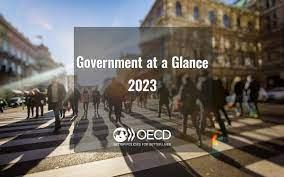
https://www.oecd.org/publication/government-at-a-glance/2023/
https://www.oecd.org/publication/government-at-a-glance/2023/#policy-act...
Democratic resilience in an era of multiple crises
Build, reinforce and protect
In recent years, multiple, consecutive crises, including the COVID-19 pandemic and Russia’s illegal war of aggression against Ukraine, have threatened economic resilience and wellbeing worldwide.
Governments in OECD countries - and democratic systems - have generally responded at scale and speed. However, in the face of major environmental, demographic, fiscal, and technological challenges, countries now need to step up efforts to strengthen trust and secure democratic resilience.
Multiple crises can further undermine trust in public institutions
In 2021, people’s trust in their national governments was evenly split, between those who trust their national government and those who do not. Trust levels towards the end of the COVID-19 epidemic were only slightly higher than after the 2008 financial crisis. Moreover, there are significant variations across countries and groups. Young people, those with low levels of education, and those living on low incomes, report lower levels of trust in government than other groups. Trust in government is also noticeably lower for people feeling a sense of financial insecurity or a lack of political voice. In a poly-crises environment, efforts will need to be made to build trust.
Public participation can be made more active and effective
Processes of participation and representation are at the heart of democracy. With more empowered and demanding citizens, it will be key to adopt innovative participation and representation mechanisms beyond traditional ones. This will also support governments’ agility when managing crisis.










Add new comment